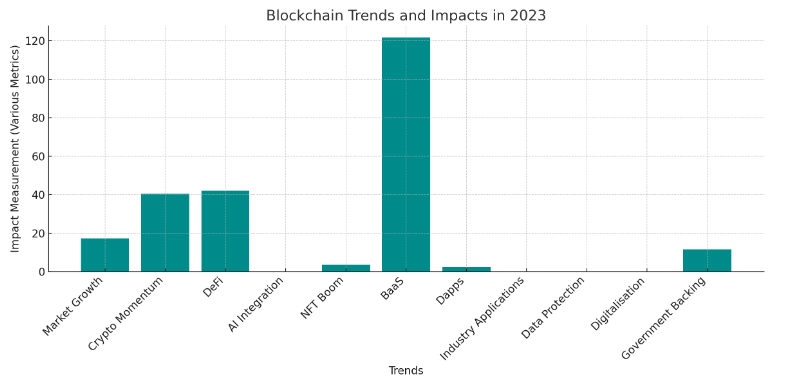In an era marked by rapid digital transformation, blockchain technology emerges as a groundbreaking innovation with the potential to redefine multiple aspects of our lives. At its core, blockchain is a digital ledger technology, known for its decentralization, immutability, and transparency. These features not only foster trust in digital transactions but also open doors to numerous applications far beyond its initial association with cryptocurrencies like Bitcoin.
The impact of blockchain technology is not confined to the financial sector alone. Its ripple effect is being felt across a multitude of industries, ranging from supply chain management to healthcare, and even governance. By enabling secure and transparent transactions, blockchain is paving the way for a more efficient, accountable, and open world. This transformative potential of blockchain makes it one of the most significant technological advancements of our time.
Understanding Blockchain Technology
What is Blockchain?
Blockchain technology is, in essence, a decentralized digital ledger. It records transactions across multiple computers in such a way that the registered transactions cannot be altered retroactively. This technology is the backbone of cryptocurrencies, allowing for secure and transparent financial transactions without the need for traditional intermediaries like banks.
Key Features of Blockchain
The hallmark features of blockchain technology include:
Decentralization: Unlike traditional ledgers maintained by a central authority, blockchain distributes its data across a network of computers, making it less prone to central points of failure.
Transparency: Every transaction on a blockchain is visible to all participants, fostering an unprecedented level of transparency.
Security: The use of cryptographic techniques ensures that once a transaction is recorded, it cannot be altered or deleted, thus providing a secure and tamper-proof system.
The Evolution of Blockchain
Blockchain’s journey began with the introduction of Bitcoin in 2009, a digital currency that challenged the conventional financial system. Since then, blockchain has evolved significantly, finding applications in various fields. From Ethereum introducing smart contracts to the emergence of blockchain in supply chain management, the evolution of this technology is a testament to its versatility and potential for future innovations.
The Disruptive Impact of Blockchain
Revolutionizing Industries
Blockchain technology is not just a digital currency enabler; it is a tool that is redefining the operational frameworks of various industries. In finance, blockchain underpins cryptocurrencies and enables smart contracts, which automate contractual processes. In supply chain management, it offers real-time tracking and enhances transparency, reducing the likelihood of fraud and errors.
Blockchain in Healthcare and Governance
In the healthcare sector, blockchain aids in secure and efficient management of medical records, ensuring privacy and accessibility. In the realm of governance, it introduces new possibilities for voting mechanisms, public record management, and streamlining bureaucratic processes.
Case Studies of Blockchain Application
Finance: Bitcoin and Ethereum are prime examples of blockchain’s application in finance, revolutionizing the way we perceive money and transactions.
Supply Chain: Companies like Maersk are utilizing blockchain to enhance transparency and efficiency in their supply chains.
Healthcare: Blockchain-based platforms are being developed for secure sharing of medical records, exemplified by projects like Patientory.
Through these applications, blockchain stands at the forefront of a technological revolution, offering solutions that are not only innovative but also hold the potential to create a more transparent, efficient, and secure world.
Blockchain and Its Societal Impacts
Reimagining Data Privacy and Individual Empowerment
Blockchain technology stands as a beacon of hope in the ongoing battle for data privacy and the empowerment of individuals. By its very design, blockchain allows for the creation of secure and transparent systems where users have greater control over their data. In an age where data breaches and misuse are rampant, blockchain offers a framework where information is decentralized and encrypted, making unauthorized access exceedingly difficult.
The empowerment of individuals is another significant societal impact of blockchain. In traditional systems, individuals often have little control or knowledge about how their data is used or stored. Blockchain’s transparency allows individuals to see exactly how their data is being used. Furthermore, smart contracts enable individuals to set terms and conditions for how their data can be accessed or shared, effectively putting them in the driver’s seat.
Addressing Challenges and Limitations
However, the road to widespread blockchain adoption is not without its challenges. One of the primary concerns is scalability. As blockchain networks grow, they often face issues with transaction speed and capacity. For instance, Bitcoin can handle only a limited number of transactions per second, leading to potential delays and increased transaction costs.
Environmental concerns also loom large, particularly with blockchain platforms that use Proof of Work (PoW) mechanisms, like Bitcoin. These require vast amounts of computational power and energy consumption, leading to a significant environmental footprint. As awareness and concern for sustainable practices grow, the pressure is on to develop more eco-friendly blockchain solutions.
The Future of Blockchain
Predictions and Trends in Blockchain Development
The future of blockchain is rife with possibilities and is likely to be characterized by rapid advancements and increased adoption. One key trend is the shift towards more sustainable and efficient consensus mechanisms, such as Proof of Stake (PoS), which require significantly less energy than PoW.
Another significant trend is the integration of blockchain with other cutting-edge technologies like Artificial Intelligence (AI) and the Internet of Things (IoT). This convergence could lead to more intelligent, interconnected, and automated systems, potentially transforming areas like supply chain management, smart homes, and personalized healthcare.
Emerging Technologies and Innovations
Decentralized Finance (DeFi) is one of the most exciting developments within the blockchain space. It represents a shift from traditional, centralized financial systems to decentralized platforms, enabling everything from lending and borrowing to insurance and asset trading, all without the need for intermediaries like banks.
Non-Fungible Tokens (NFTs) are another innovation gaining traction. These digital assets represent ownership or proof of authenticity of a unique item or piece of content, using blockchain technology. From art and music to virtual real estate and collectibles, NFTs are opening up new avenues for digital ownership and creativity.
Decentralized Autonomous Organizations (DAOs) are also emerging as a new form of organizational structure. Operated by smart contracts and governed by community members, DAOs offer a democratic and transparent way of decision-making, potentially revolutionizing how businesses and organizations operate.
While blockchain technology faces challenges, its potential societal impacts and future developments paint a picture of a technology at the cusp of revolutionizing not just industries, but the very fabric of society. As blockchain continues to evolve, it promises to bring forth a wave of innovation, efficiency, and empowerment that could reshape the world as we know it.
Implementing Blockchain in Your Business
Step-by-Step Integration of Blockchain Technology
Implementing blockchain technology in your business can be a transformative move. Here’s a comprehensive guide to navigating this process:
Identify the Need: Determine the specific problems or challenges in your business that blockchain can solve. This could range from enhancing data security to streamlining supply chain operations.
Understand Blockchain Basics: Gain a basic understanding of blockchain technology, its functionalities, and limitations. This knowledge is crucial for making informed decisions.
Choose the Right Blockchain: Not all blockchains are created equal. Evaluate if a public, private, or consortium blockchain suits your business needs. Factors to consider include transaction speed, scalability, security, and governance models.
Develop a Use Case: Create a clear and detailed use case for the blockchain application. This should outline the objectives, processes to be blockchain-enabled, and the expected outcomes.
Assemble a Skilled Team: Build a team with expertise in blockchain technology, including developers, project managers, and blockchain consultants. Consider training your existing staff in blockchain technology.
Select Technology Partners: Partner with established blockchain technology providers for development and implementation support. Ensure they have a proven track record and offer robust support.
Prototype Development: Start with developing a prototype or a minimum viable product (MVP). This stage is critical for testing the feasibility of the blockchain solution in a controlled environment.
Test and Iterate: Rigorously test the prototype for performance, security, and scalability. Collect feedback and make necessary adjustments.
Implement and Integrate: Once the solution is tested and refined, proceed with full-scale implementation and integration into your business processes.
Monitor and Update: Continuously monitor the system post-implementation for any issues or improvements. Keep the system updated with the latest blockchain developments and security protocols.
Considerations for Blockchain Implementation
Regulatory Compliance: Ensure your blockchain solution complies with relevant regulations and data protection laws.
Scalability: The blockchain solution should be scalable to accommodate your business’s growth and transaction volume.
Cost: Evaluate the cost implications, including development, maintenance, and operational costs.
Security: Prioritize security features to protect against fraud and cyber threats.
Top 10 Revolutionary Blockchain Applications
Blockchain technology’s versatility allows it to be applied in various fields. Here are ten innovative applications:
1. Cryptocurrencies: Digital currencies like Bitcoin and Ethereum are the most prominent applications of blockchain for secure and decentralized financial transactions.
2. Smart Contracts: Automated contracts that execute when predetermined conditions are met, used in various sectors from real estate to legal processes.
3. Supply Chain Management: Blockchain enhances transparency and traceability in supply chains, enabling real-time tracking of products from production to delivery.
4. Voting Systems: Blockchain-based voting systems offer a secure, transparent, and tamper-proof method for conducting elections.
5. Healthcare Data Management: Secure and efficient management of patient records, enabling seamless sharing between authorized parties while maintaining patient privacy.
6. Digital Identity Verification: Blockchain provides a secure and immutable way of managing digital identities, reducing fraud and identity theft.
7. Decentralized Finance (DeFi): Financial services like lending, borrowing, and insurance conducted on blockchain without traditional financial intermediaries.
8. Intellectual Property Protection: Blockchain assists in proving the authenticity and ownership of intellectual property like patents, copyrights, and trademarks.
9. Real Estate Transactions: Streamlining real estate transactions, including property verification, due diligence, and secure transfer of ownership.
10. NFTs for Art and Collectibles: Non-Fungible Tokens (NFTs) revolutionize the way we buy, sell, and prove ownership of digital art and collectibles.
Each of these applications demonstrates blockchain’s potential to revolutionize traditional processes, making them more secure, efficient, and transparent. As businesses and industries continue to explore blockchain’s possibilities, its impact is likely to grow even more significant in the years to come.
Blockchain Trends and Impacts in 2023

:
Graphical Overview
The bar graph provides a detailed visualization of key blockchain trends and their impacts in 2023. It covers various aspects like market growth, cryptocurrency momentum, DeFi, AI integration, NFTs, and government backing. The graph uses specific metrics to quantify each trend’s impact.
Trend Analysis
Market Growth: Blockchain market projected to reach $17.21 billion by 2023, indicating rapid growth.
Crypto Momentum: Daily Bitcoin transactions highlight the increasing importance of cryptocurrencies.
DeFi: $42 billion in DeFi’s Total Value Locked showcases significant growth in decentralized finance.
AI Integration: The integration with AI represents innovative developments.
NFT Boom: NFTs expected to generate $3.55 billion in revenue, reflecting their popularity.
BaaS: Blockchain as a Service market projected to reach $121.7 billion, emphasizing its scalability and convenience.
Dapps: Surge in decentralized applications underlines the demand for blockchain solutions.
Industry Applications: Broad adoption in sectors like BFSI, retail, and healthcare.
Data Protection: Rising awareness of data protection drives blockchain adoption.
Digitalisation: Industries leverage blockchain for enhanced data security and efficiency.
Government Backing: Governments’ investment in blockchain reaches $11.65 billion, indicating strong support.
Blockchain’s Role in Shaping Tomorrow’s World
Driving Future Innovations and Societal Changes
Blockchain technology, at its essence, is a catalyst for change, ushering in a new era of digital innovation and societal transformation. Experts believe that blockchain’s most significant impact will be seen in its ability to democratize data and empower individuals. By decentralizing data storage and management, blockchain challenges traditional power structures and paves the way for more equitable and transparent systems. This shift has the potential to revolutionize everything from finance and governance to personal data ownership and privacy.
Navigating Ethical and Regulatory Landscapes
However, as with any transformative technology, blockchain presents its own set of ethical and regulatory challenges. The decentralization that blockchain brings can sometimes clash with existing legal and regulatory frameworks, particularly in areas like data protection, financial regulation, and intellectual property rights. Additionally, the ethical implications of widespread blockchain adoption, such as the potential for unequal access and the need for robust cybersecurity measures, require careful consideration and proactive management.
FAQs
What is Blockchain Technology?
Blockchain is a decentralized digital ledger technology that records transactions across multiple computers in a secure and tamper-proof way.
What Are the Primary Benefits of Blockchain?
The primary benefits include enhanced security, transparency, and efficiency in transactions, along with reduced instances of fraud and corruption.
Are Blockchain and Bitcoin the Same?
No, they are not the same. Bitcoin is a cryptocurrency that operates on a blockchain platform. Blockchain is the underlying technology that supports various applications, including cryptocurrencies.
What Are the Challenges of Blockchain?
Key challenges include scalability, energy consumption (especially in Proof of Work systems), and integration with existing systems.
Can Blockchain Be Regulated?
Yes, blockchain can be regulated, but it presents unique challenges due to its decentralized nature. Regulatory frameworks are evolving to address these challenges.
Is Blockchain Secure?
Yes, blockchain is generally very secure due to its cryptographic algorithms and decentralized structure. However, like any technology, it is not completely immune to risks.
In conclusion
As we delve into the intricacies and possibilities of blockchain technology, it becomes evident that we are standing at the brink of a technological revolution. Blockchain’s potential to transform industries and redefine societal structures is immense. Its implications for data security, transparency, and efficiency mark it as a pivotal force in shaping the digital future. To fully harness this potential, staying informed and engaged with the ongoing developments in blockchain is crucial. The journey of blockchain is not just about technological evolution; it’s about paving the way for a more secure, transparent, and equitable world.

Eric Dalius is The Executive Chairman of MuzicSwipe, a music and content discovery platform designed to maximize artist discovery and optimize fan relationships. He also hosts the weekly podcast “FULLSPEED,” showcasing conversations with trailblazing entrepreneurs from various fields. Through the “Eric Dalius Foundation,” Eric has created four scholarships for US students. Connect with Eric on Twitter, Facebook, LinkedIn, Instagram, and Entrepreneur.com.

